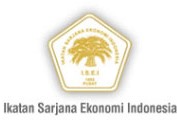Impacts of Government and Household Expenditure on Human Development Index
(1) Economics and Business Faculty, Magister Management Programme, Post Graduate Programme, Mercu Buana University, Jakarta
(2) Economics and Management Faculty, Bogor Agricultural University
(3) Economics and Management Faculty, Bogor Agricultural University
Abstract
The objective of this reseach are to: (1) analyze the factors affecting human development index and household expenditures for health, education and others, (2) predict the impacts of government expenditure policy in the field of education, health, and infrastructure on human development index in Central Java. The model was built using econometric approach in the form of a system of simultaneous equations, including five blocks i.e. government's revenue, expenditures, input, output, and performance. The system of simultaneous equations consisted of 26 equations (19 structural equations and 7 identity equations). The estimation method used Two Stage Least Squares with SYSLIN procedure. Prediction simulation used the stepwise Autoregressive method. The model simulation used Newton's method and SIMNLIN procedure. The results of policy simulation concludes that the combination of the increase in government expenditure for education and infrastructure lead to better performance in increasing income per capita, disposable income and HDI compared to the combination of the policy of the increase in government expenditure for education and in both municipalities and district, but municipalities receive greatest impact compared to the district.
Keywords
Full Text:
PDFReferences
Albanesi, S., 2007. Inflation and inequality. J. Monet. Econ. 54, 1088–1114. doi:10.1016/j.jmoneco.2006.02.009
Amir, A., 2008. Sumber-sumber Pertumbuhan Ekonomi Indonesia. Fakultas Ekonomi, Universitas Jambi, Jambi.
Cahyadhi, P.E., 2005. Pelacakan Faktor-faktor yang Mempengaruhi Indeks Pembangunan Manusia (Tesis Magister). Universitas Indonesia, Jakarta.
Central Bureau of Statistics, 2017. Provinsi Jawa Tengah Dalam Angka 2017. CBS Central Java Province, Semarang.
Gould, F., 1983. The Development of Public Expenditures in Western, Industrialised Countries: A Comparative Analysis. Public Finance Financ. Publiques 38, 38–69.
Hakim, A., Setiawan, M.B., 2013. Indeks Pembangunan Manusia Indonesia. J. Econ. 9.
Hess, P., Ross, C., 1997. Economic Development: Theories, Evidence and Policies. Harcourt Brace College Publishers, Fort Worth.
Koutsoyiannis, A., 1977. Theory of Econometrics: An Introductory Exposition of Econometric Methods. MacMillan Press Ltd, London.
Landau, D., 1986. Government and Economic Growth in the Less Developed Countries: An Empirical Study for 1960-1980. Econ. Dev. Cult. Change 35, 35–75. doi:10.1086/451572
Mirza, D.S., 2012. Pengaruh Kemiskinan, Pertumbuhan Ekonomi dan Belanja Modal terhadap Indeks Pembangunan Manusia di Jawa Tengah Tahun 2006-2009. Econ. Dev. Anal. J. 1, 1–14.
Myers, C.A., 1963. Education, Manpower and Economic Growth. Acad. Manag. Proc. 1963, 69–70. doi:10.5465/AMBPP.1963.5068061
Nanga, M., 2006. Dampak transfer fiskal terhadap kemiskinan di Indonesia : suatu analisis simulasi kebijakan.
Novignon, J., Aboagye, E., Agyemang, O.S., Aryeetey, G., 2015. Socioeconomic-related inequalities in child malnutrition: evidence from the Ghana multiple indicator cluster survey. Health Econ. Rev. 5, 34. doi:10.1186/s13561-015-0072-4
Pangastuti, Y., 2015. Analisis Pembangunan Sumber Daya Manusia Di Provinsi Jawa Tengah Tahun 2009-2013. J. Ekon. Dan Kebijak. 8, 238–249.
Pratowo, N.I., 2013. ANALISIS FAKTOR-FAKTOR YANG BERPENGARUH TERHADAP INDEKS PEMBANGUNAN MANUSIA. J. Studi Ekon. Indones.
Ram, R., 1986. Government Size and Economic Growth: A New Framework and Some Evidence from Cross-Section and Time-Series Data. Am. Econ. Rev. 76, 191–203. doi:10.2307/1804136
Saunders, P., 1985. Public Expenditure and Economic Performance in OECD Countries. J. Public Policy 5, 1–21. doi:10.1017/S0143814X00002865
Sen, A., 2001. Development as Freedom. OUP Oxford.
Siregar, H., Wahyuniarti, D., 2007. Dampak Pertumbuhan Ekonomi Terhadap [WWW Document]. Scribd. URL https://www.scribd.com/doc/90938063/Dampak-Pertumbuhan-Ekonomi-Terhadap (accessed 8.30.17).
Sitepu, R.K.-K., 2007. Dampak investasi sumberdaya manusia dan transfer pendapatan terhadap distribusi pendapatan dan kemiskinan di Indonesia. The impact of human resource investment and income transfer on income distribution and poverty in Indonesia.
Smith, D., 1985. Public Consumption and Economic Performance. Natl. Westminst. Bank Quartely Rev.
Sulistyowati, N., 2013. The Effect of Educational, Health, Infrastructure Expenses on the Workforce Employment and Poverty - ProQuest. Int. J. Adm. Sci. Organ. 20, 121–128.
Sulistyowati, N., Harianto, H., Priyarsono, D.S., Tambunan, M., 2010. DAMPAK INVESTASI PENDIDIKAN TERHADAP PEREKONOMIAN DAN KESEJAHTERAAN MASYARAKAT KABUPATEN DAN KOTA DI JAWA TENGAH. J. Organ. Dan Manaj. 6, 158–170.
Sumas, S., 2012. Dampak kebijakan fiskal sektor pendidikan dan sektor kesehatan terhadap indeks pembangunan manusia di Indonesia.
Todaro, M.P., Smith, S.C., 2006. Economic Development 9th Edition. Pearson Education Limited, United Kingdom.
United Nations Development Program, 2016. Human Development Report 2016: Human Development for Everyone. United Nations Development Program, New York.
Utami, D.R., 2007. Analisis Pengaruh Pengeluaran Pemerintah Daerah Kabupaten/ Kota di Bidang Pendidikan dan Kesehata terhadap Indeks Pembangunan Manusia (Tesis Magister). Universitas Indonesia, Jakarta.
Yudhoyono, S.B., 2004. Pembangunan Pertanian dan Perdesaan Sebagai Upaya Mengatasi Kemiskinan dan Pengangguran: Analisis Ekonomi Politik Kebijakan Fiskal (Disertasi Doktor). Institut Pertanian Bogor, Bogor.
Refbacks
- There are currently no refbacks.

This work is licensed under a Creative Commons Attribution 4.0 International License.






